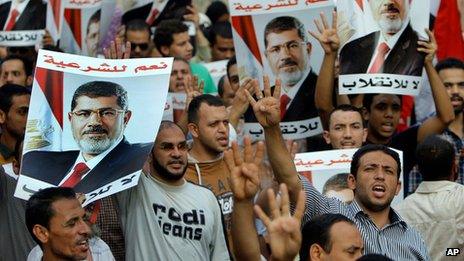Egypt: What poll results reveal about Brotherhood's popularity
- Published

Egypt's Muslim Brotherhood won every democratic vote held in Egypt since the fall of President Hosni Mubarak - but the results alone do not give a true picture of the strength of their popularity.
Assessing the popularity of Arab presidents, their political parties, and ideologies had long been impossible, given the absence of free speech and assembly under the Middle East's authoritarian governments.
That changed with the Arab Spring when democracy, which evolved over centuries in most countries, was introduced almost overnight into several of the region's states.
Egypt's famous revolution of 2011 now faces profound challenges, but it did bring - for a few years at least - democratic institutions: Two referendums, and three elections, all largely free and fair and, so the adage goes, all won by the Muslim Brotherhood and its Freedom and Justice Party (FJP).
So how is it that the Brotherhood, which formed Egypt's first democratic government, now finds hundreds of its supporters dead, its leaders arrested, and its very legality once again questioned as it confronts vigorous suppression by the military authorities? How can the army have done this in the name of "popular demand"? And how is it that millions of Egyptians have gathered to support the military's policy?
Part of the answer lies in scrutiny of the notion that the Brotherhood won Egypt's five democratic votes, or that these victories represented mass popular appeal.
A deeper explanation is that whilst these votes were political victories for the Brotherhood, they were not evidence of widespread popularity. The Brotherhood's support base was more limited, and Egypt's politics more polarised, than the group's electoral success seemed to suggest.
First vote: Constitutional referendum of March 2011
Egyptians voted on whether to amend the existing constitution, or scrap it altogether. The Brotherhood campaigned for amendment rather than abolition, an argument which won by receiving 77% of votes in favour rather than 23% against. Turnout was 41% of the electorate. But referendums are votes on issues, not political parties, and the Brotherhood was one of several prominent groups campaigning for amendment. Calling the result a victory for the Brotherhood alone is therefore problematic, and regarding the result as a symbol of the Brotherhood's broad popularity is harder still.
Second vote: Elections to People's Assembly, Nov 2011-Jan 2012
The Brotherhood's FJP was one of dozens of competing parties. It won 43% of the seats in the People's Assembly, the lower house of parliament, with 37.5% of the cast votes, when turnout was 52% of the electorate. Other more conservative Islamist groups also did well, winning 25% of the seats. So it was an FJP victory in the sense that it was the single best performing party, and it achieved a strong position to influence legislation. But its vote numbers, and the turnout figures, make it hard to see this vote as a sign of broad popularity for the FJP.
Third vote: Elections to Shura Council, Jan-Feb 2012
Again, the FJP is the single best performing party, winning 58% of the contested seats from 45% of the cast votes. So another victory for its place in the legislative process, but again hardly an indication of widespread popular support. Turnout was a meagre 10% of registered voters.
Fourth vote: Presidential election, June 2012
Mohammed Morsi, representing the FJP and Muslim Brotherhood, won less than a quarter of the votes in the first round. Yet in the second round he achieved the group's best ever electoral performance - 51.7% of the vote from a turnout of 52%. But keep in mind that Mr Morsi's opponent in that second round, just over a year after the revolution which deposed Hosni Mubarak, was Ahmad Shafik, the former president's last prime minister, fellow officer, and close confidant. So 48% of those Egyptians who voted preferred to vote for Mr Mubarak's associate, rather than Mohammad Morsi. The Brotherhood's most important victory may therefore have revealed the true depth of Egypt's political polarisation.
Fifth vote: Constitutional referendum of Dec 2012
This referendum was far more controversial then the first, and far more a vote on the Brotherhood's popularity. Several liberal and Christian groups had withdrawn from the assembly tasked with writing Egypt's new constitution, complaining that Islamists were dominating the process. Yet far from allowing an annulment of the document, as the opposition would have liked, Mr Morsi issued a temporary decree giving himself immunity from prosecution and allowing an assembly now dominated by Islamists to pass their final draft of the constitution.
The document was put to a public vote, and the opposition called on their supporters to boycott the referendum. The Brotherhood, and other Islamist, urged their supporters to vote. The constitution was approved, 64% in favour and 35% against, but the turnout was 33% of the electorate. Once again, this was a political victory for the Brotherhood, but not a demonstration that it enjoyed mass support. Indeed, the unpopularity of the group's government amongst many Egyptians was becoming increasingly apparent.
So the Brotherhood's "five victories" were favourable political results, but they concealed that the group's base of dedicated political support was smaller - even at its height - than many believed possible given its organisational capabilities.
The Brotherhood has enjoyed, and still enjoys a significant support base. Yet analysis of past votes indicates that it never achieved mass popularity.
Opinion polls can be doubted, and election data can be interpreted in different ways, and neither can fully explain how the Muslim Brotherhood went from power to persecution within the space of a few weeks.
That may nevertheless help explain why some Egyptians have reacted to its fate with celebration rather than shock.